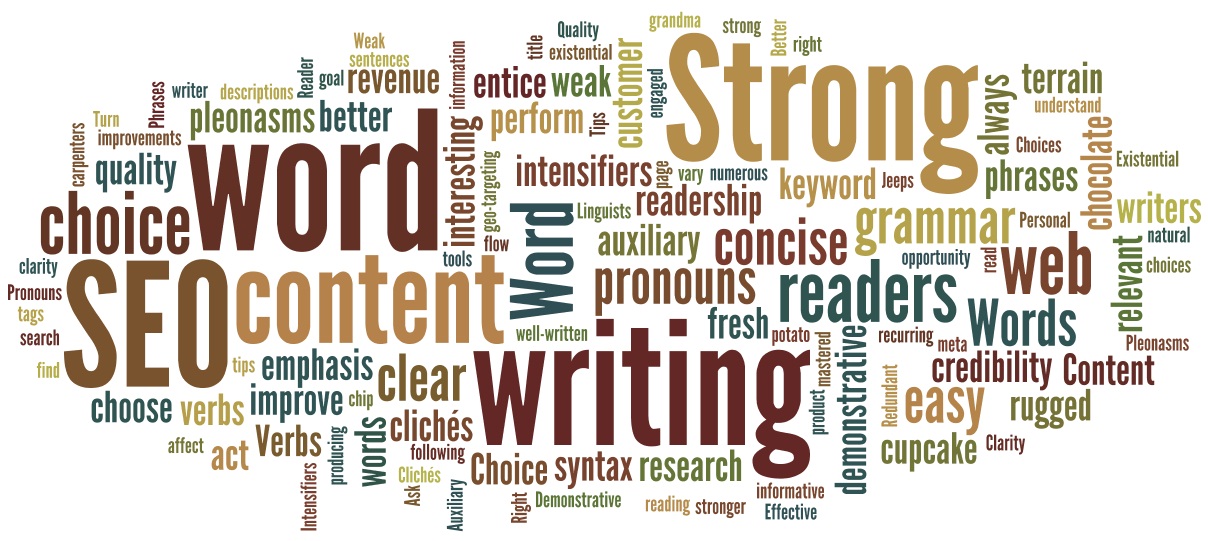Choosing the Right Word
The main goal of an SEO content writer is two-fold: keep readers on the page and entice them to act. This is done by providing readers with relevant information related to their search and presenting it in a way that’s easy to find, easy to read, and easy to understand. When writing is informative and well-written, readers are more engaged in what you have to say, keeping them around longer. This leads to increased credibility, a larger following, and eventually loyal buyers and recurring revenue.

Why Word Choice Matters
Effective writing all begins with word choice. Words are to writers what tools are to carpenters. They are essential to the craft, and the better the word, the better the product. No one would use plastic Tonka Tools to build a house, so why would writers use empty, inexpressive words and expect the next great American novel? As a general rule, there are no bad words. You can write anything you like, however, with uninteresting, even bland content, your reader either succumbs to a slow, boring death or simply moves on to something better (AKA your competitor).
Turn Weak Words into Strong Words
Content writers should think twice before using any vague or unnecessary words. The following weak word choices are overused and simplistic and have the potential to weaken your writing and negatively affect your readership. A good rule to follow is if it doesn’t add to the clarity, emphasis, or meaning, then get rid it.
Intensifiers
very, pretty, really, so, kind of, and sort of
Weak: This potato chip sort of looks like the President.
Strong: This potato chip looks exactly like the President.
Auxiliary Verbs or Helping Verb
am, is, are, was, were, be, being, and been
Weak: Grandma is out of town with her Bingo Club.
Strong: Grandma travelled out of town with her Bingo Club.
Existential Pronoun
there
Weak: There are numerous ways to improve your grammar.
Strong: Linguists suggest numerous ways to improve your grammar.
Personal Pronoun
he, she, him, her, it, I, you, they, we, me, us, and them
Weak: She gave him her chocolate cupcake.
Strong: Sarah gave Jeremy her chocolate cupcake.
Demonstrative Pronouns
this, that, these, and those
Weak: These perform well on rugged terrain.
Strong: Jeeps perform well on rugged terrain.
Clichés
fit as a fiddle, what goes around comes around, time is money, and more
Weak: My new dog, Ruffles, cost an arm and a leg.
Strong: My new dog, Ruffles, cost me my whole paycheck.
Pleonasms, or Redundant Phrases
added bonus, ATM machine, all together, close proximity, and more
Weak: The store clerk offered the customer a free gift valuing $50 dollars.
Strong: The store clerk offered the customer a gift valuing $50.
Don’t get me wrong, weak words aren’t always a bad choice. In fact, sometimes they just fit more naturally into your content. I use them all the time in my own writing; however any time you have the opportunity to replace a weak word with a strong word, ALWAYS choose the stronger of the two. And, if you do choose a weak word, use them sparingly and vary your syntax to keep your sentences fresh and interesting.
Questions to Ask Yourself for Better Word Choices
- Does my word choice deter or confuse readers?
- Is my writing natural, and does it flow well? (I recommend reading aloud to catch any noticeable issues.)
- Can I choose a stronger word without sacrificing the coherence or flow of the passage?
Making improvements on your word choice is just the first step in producing quality SEO content. Once you’ve mastered writing clear, concise sentences, you can move on to advanced keyword research, geo-targeting, title tags, and meta descriptions.
Stay tuned to learn more!



The correct words make all the difference.
Great tips. Another issue is the use of too much jargon in the content.
Jun, that’s a great point. Content writing needs to be easily accessible to all people, not just industry professionals, and that often means gearing your writing to a high school reading level. The more people can read and understand what you’re saying, the more receptive your audience will be. Now, that doesn’t mean you shouldn’t use the opportunity to teach people a few things like the meaning of acronyms (SEO, SMO, PPC, etc), but the key is to teach them in an unobtrusive, informative way. An educated consumer is the best consumer.
Jun, that’s a great point. Content writing needs to be easily accessible to all people, not just industry professionals, and that often means gearing your writing to a high school reading level. The more people can read and understand what you’re saying, the more receptive your audience will be. Now, that doesn’t mean you shouldn’t use the opportunity to teach people a few things like the meaning of acronyms (SEO, SMO, PPC, etc), but the key is to teach them in an unobtrusive, informative way. An educated consumer is the best consumer.